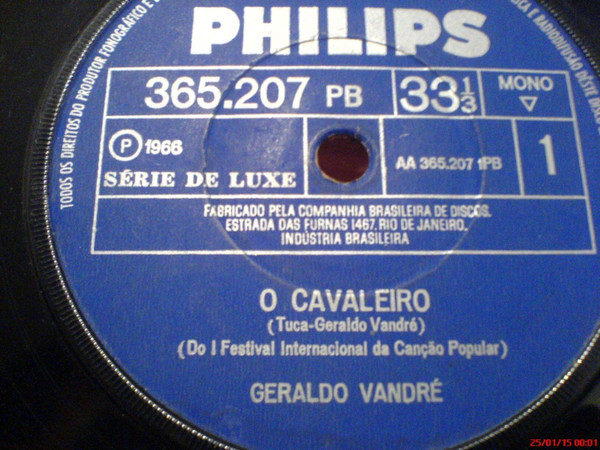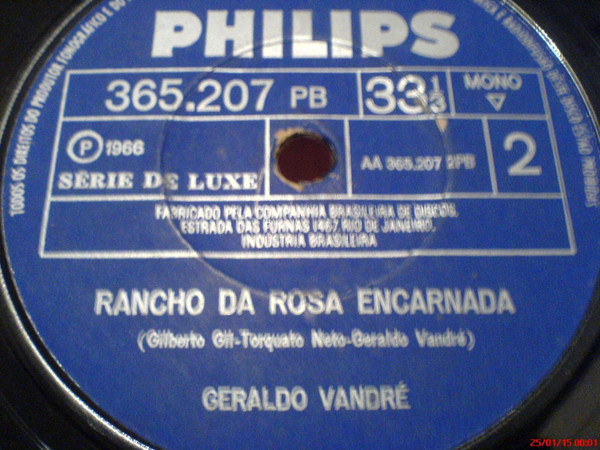Geraldo Vandré - O Cavaleiro Rancho Da Rosa Encarnada
Table of Contents
Download
Filename: geraldo-vandr-o-cavaleiro-rancho-da-rosa-encarnada.rar- MP3 size: 8.6 mb
- FLAC size: 86.4 mb
Tracks
| Track | Duration | Preview |
|---|---|---|
| Rancho Da Rosa Encarnada | ||
| O Cavaleiro |
Images


Catalog Numbers
365.207 PBLabels
PhilipsListen online
- lyssna på nätet
- écouter en ligne
- online anhören
- lytte på nettet
- escuchar en línea
- ascolta in linea
- ouvir online
- online luisteren
- kuunnella verkossa
Formats
- Vinyl
- 7"
- Single
- Promo
About Geraldo Vandré
Geraldo Vandré (born in João Pessoa, Paraíba, September 12, 1935), is a Brazilian singer, composer and guitar player.
In 1966 his song Disparada (Gone Off), interpreted by Jair Rodrigues, was a success at the Record Festival. The song rose to number one, tied with Chico Buarque's "A banda".
In 1968 Vandre entered his song Pra não dizer que não falei das flores (also known as Caminhando (Walking)) in the International Song Festival. One song had the following refrain:
Come, let's go
'Cause to wait is not to know
Those who know choose the time
They don't wait for it to happen
This was thought to be a call to fight the dictatorship in charge. The song lost to Sabia by Chico Buarque and Tom Jobim. Also in 1968, still with the Al-5, Vandre had to go into exile. The first artist ever to sing Caminhando after censorhip's lift was Simone in 1979, reaching enormous success from both public and critics.
First he stayed at the farm of the late Guimaraes Rosa, who had died the previous year, then he proceeded to Chile, and finally to France.
Since returning to Brazil in 1973, Vandré has been living and composing in São Paulo. He discounts rumors that he has been tortured, saying that the image of "Che Guevara" singer stifles his workmanship. One of his recent songs has been Fabiana, written in honor of the Brazilian Air Force (Força Aérea Brasileira - FAB) and presented at the São Paulo Municipal Library some time in the 1990s.n
Real Name
- Geraldo Pedrosa de Araujo Dias
Name Vars
- G Vandré
- G. Nadré
- G. Pedrosa
- G. Vanare
- G. Vandre
- G. Vandrè
- G. Vandré
- G. Vandré-Theo
- G. Vendré
- G.Vandré
- G.Vandré-Theo
- Gerald Vandre
- Geralde Vandre
- Geraldo
- Geraldo Valdré
- Geraldo Vandre
- Geraldo Vandrè
- Geraldo Vandré-Theo
- Geraldo Vaudré
- Geraldo Vendré
- Geraldo Wandré
- Gerardo Vandré
- Giraldo Valdré
- Guimorva Vandré
- Géraldo Vandre
- Theo Geraldo Vandre
- Vandre
- Vandrè
- Vandré
- Вандре
